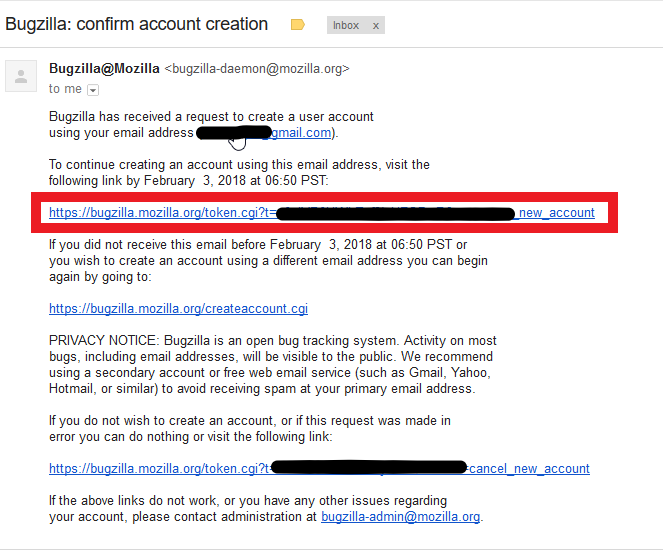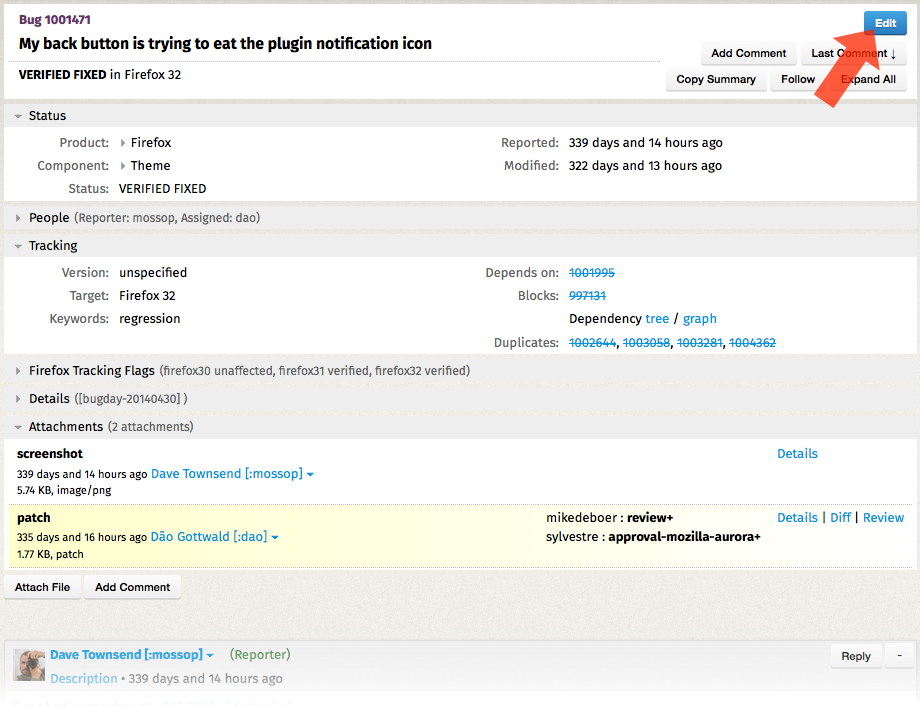Mozilla’s bug tracker is at https://bugzilla.mozilla.org/, which is often abbreviated as BMO.

Download WebCompat to Bugzilla for Firefox. WebExtension helps you copy a webcompat issue to bugzilla bug, including create a new bug or append to see also field. All teams working on Firefox using either or both Mozilla-central and Bugzilla are expected to follow the following process. What is a Triaged Bug ¶ The new definition of Triaged will be Firefox-related bugs of type defect where the component is not UNTRIAGED, and a severity value not equal to - or N/A.



A recently added bug to Mozilla's bug tracking site Bugzilla indicates that Firefox may soon display sponsored top sites on the New Tab page. The bug requests that a preference is added to Firefox to disable sponsored top sites.
You don’t need an account if you simply want to build the code and modify it, but you will need an account in Bugzilla if you want to file or comment on bugs, send patches, get assigned to bugs (so you can ‘claim’ them), etc.
Note: if you are a Mozilla employee, don’t use an email alias to sign up, use your full LDAP account.
To make yourself easier to find by other colleagues (for example when they’re trying to set a reviewer for a patch), you can edit the real name field to add your alias or any other word they might use to search for you there. The convention is to use something like YourName:alias:ldap/:ircnick. For example: MarySmith:mary:msmith
There are lots of ways to contribute to the Mozilla project: coding, testing, improving the build process and tools, or contributing to the documentation. This guide provides information that will not only help you get started as a Mozilla contributor, but that you'll find useful to refer to even if you are already an experienced contributor.
Documentation topics
- Getting Started
- A step-by-step beginner's guide to getting involved with Mozilla.
- For new Mozilla developers
- A directory of articles which are particularly helpful for new Mozilla developers.
- Working with Mozilla Source Code
- A code overview, how to get the code, and the coding style guide.
- Build Instructions
- How to build Firefox, Thunderbird, SeaMonkey, or other Mozilla applications.
- Editor Configuration
- Tips on setting up your favorite IDE or text editor to work with Mozilla projects.
- Development process overview
- An overview of the entire Mozilla development process.
- Managing multiple profiles
- When working with prerelease versions of Firefox, it's often helpful to have multiple Firefox profiles, such as one for each channel, or for different kinds of testing.
- Automated Testing
- How to run Mozilla's automated tests, and how to write new tests.
- How to submit a patch
- After getting your patch written, you need to get it checked into the tree. This article explains the review process and how to get your patch approved.
- Getting documentation updated
- How to ensure that documentation is kept up to date as you develop.
- Mozilla modules and module ownership
- This article provides information about Mozilla's modules, what the role of a module owner is, and how module owners are selected.
- Code snippets
- Useful code samples for a wide variety of things you might need to figure out how to do.
- Mozilla development strategies
- Tips for how to make the most of your time working on the Mozilla project.
- Debugging
- Find helpful tips and guides for debugging Mozilla code.
- Performance
- Performance guides and utilities to help you make your code perform well (and to play nicely with others).
- The Mozilla platform
- Information about the workings of the Mozilla platform.
- Mozilla
- Much more additional information about Mozilla coding practices.
- Adding APIs to the navigator object
- How to augment the
window.navigatorobject with additional APIs. - Interface Compatibility
- Guidelines for modifying scriptable and binary APIs in Mozilla.
- Customizing Firefox
- Information about creating customized versions of Firefox.
- Task-Graph Generation
- What controls the jobs that run on a push to version control? How can you change that?
- Virtual ARM Linux environment
- How to set up an ARM emulator running Linux for testing ARM-specific, but not necessarily platform-specific, code. Useful for mobile developers.
- Obsolete Build Caveats and Tips
- A place to put build tips which are no longer relevant to building the latest version of the code from main but are relevant when building old codebases.
- Firefox Source Docs
- Web-hosted documentation built from the mozilla-central source code.
Tools
Firefox Android Bugzilla
- Bugzilla
- The Bugzilla database used to track issues for Mozilla projects.
- SearchFox
- Mozilla code searching. Indexes JS as well as C++, includes blame capabilities. In active development.
- Mercurial
- The distributed version-control system used to manage Mozilla's source code.
- Mozilla build VM
- A VirtualBox compatible virtual machine configured with all the software needed to build and work on Firefox.
- TaskCluster
- TaskCluster is the task execution framework that supports Mozilla's continuous integration and release processes.
- Treeherder
- Treeherder shows the status of the tree (whether or not it currently builds successfully). Check this before checking in and out, to be sure you're working with a working tree.
- Perfherder
- Perfherder is used to aggregate the results of automated performance tests against the tree.
- Crash tracking
- Information about the Socorro crash reporting system.
- Callgraph
- A tool to help perform static analysis of the Mozilla code by generating callgraphs automatically.
- Developer forums
- A topic-specific list of discussion forums and mailing lists where you can talk about Mozilla development issues.
- Mozilla Platform Development Cheat Sheet (archive.org)
- Brian Bondy's list of frequently referenced information for platform developers. Brian Bondy took down codefirefox.com, but the archived cheatsheet might still be useful.
- Firefox development video tutorials
- Brian Bondy's video tutorials on Firefox development.

Comments are closed.